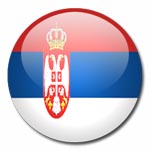Esperanto is a family affair in Serbia
 Belgrade - Iva is a typical 4-year-old girl from Serbia. She enjoys summer vacation with her family, plays with her friends and argues with her little brother. The only thing that makes her different is that she does all of these things in Esperanto.
Belgrade - Iva is a typical 4-year-old girl from Serbia. She enjoys summer vacation with her family, plays with her friends and argues with her little brother. The only thing that makes her different is that she does all of these things in Esperanto.
Iva is one of dozens of children in Serbia whose mother tongue is Esperanto, an artificial language developed at the end of the 19th century. Most of these children come from bilingual marriages.
Iva's father, Hokan Lundberg, is a Swede, and her mother, Sonja Petrovic, is a Serb.
The Lundberg family lives in central Serbia, and together with 35 other families from all over the world, they participated in the Esperanto Family Congress last month in northern Serbia.
The Coke family in the village of Mali Idjos, themselves Esperantists, hosted the event on their farm.
It was Esperanto that brought Lundberg and Petrovic together. When they met, neither could speak the other's native language. It has become the family language because it is the second language in which the two parents are most fluent.
"The congress, held on a little farm run by an Esperanto-speaking family, was a good place for the children and families to meet and spend their summer vacation," Serbian Esperantist Dimitrije Janicic told the German Press Agency dpa.
"It was wonderful to see those young children laughing, playing and speaking in Esperanto," said Janicic who has been an Esperanto teacher and journalist for the past 30 years. "They are the future of Esperanto in Serbia."
Janicic, who lives in Belgrade, writes for the official magazine of the Esperanto Society.
Esperanto is the most widely spoken artificial language.
It was constructed by a Pole, Dr. Ludwik Lazarz Zamenhof, who was born to parents of Lithuanian and Jewish descent in a part of Poland in 1859 which was then part of the Russian Empire.
He spoke Russian, Polish, Yiddish and, since his father was a German teacher, German, too.
Later he learned French, Greek, Hebrew and Latin. He came up with the idea of creating a new language with simple grammatical rules that would be a neutral communication tool between people of different ethnic and linguistic backgrounds.
In 1887, Zamenhof published a book titled Lingvo Internacia, under the pseudonym Dr. Esperanto. Thus the new language was born.
"Among Zamenhof's students were three Serbs, and the first book in Esperanto was published in Serbia in 1901," Janicic said.
Now, a hundred years since Esperanto came to Serbia, there are only about 1,000 people in the country who speak the language, of whom half are "permanent beginners," Janicic added.
"That is our main problem, most of the Esperantists are old. We need fresh blood and that is why this congress was such a joy and a proof that Esperanto is a living language," he said.
During the congress in Mali Idjos, children aged from 3 to 18 from all over the world participated in language and arts workshops, played, sang, and wrote poetry and stories in Esperanto.
The family congeress is not the first, and it won't be the last for several families, including the Lundbergs. Iva's maternal grandfather, Esperantist Radojca Petrovic, said he enjoyed watching his grandchildren playing.
Iva's younger brother, Dag, is still too young to study, but he enjoyed the congress nevertheless. He loved Hungarian sweet tomato soup prepared during the week-long gathering and playing with new friends, Petrovic said.
"We will return here again. This place bring such joy."
Janicic believes that gatherings like this are proof that Esperanto could and should become the European Union's official language.
"It would facilitate the work of the EU, and all the documents would be translated into one language only. Plus, nobody would be offended or insulted, because Esperanto is a constructed language," Janicic said.
In fact, it was a desire to avoid disputes over language that inspired Zamenhof's invention. He was frustrated by the quarrels between Poles, Germans and Belorussians living in his hometown of Bialystok.
He hoped the new language would help overcome religious, ethnic and linguistic differences.
The family gathering in Mali Idjos, attended by people from Germany, Turkey, Africa, China, Japan, Bangladesh and Serbia, among other places, is proof that Zamenhof's dream can be fulfilled, Janicic said. (dpa)